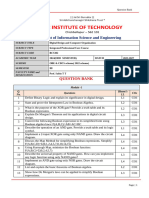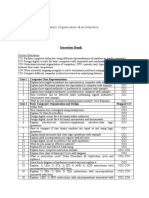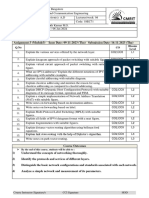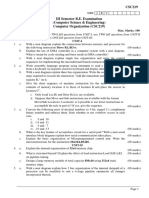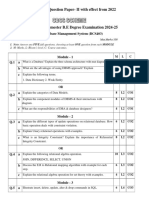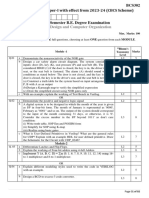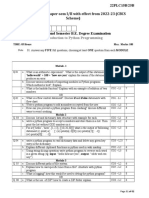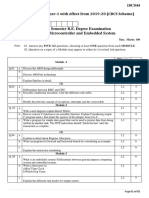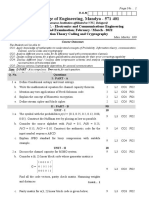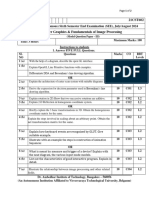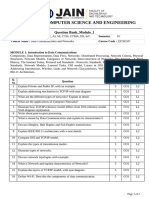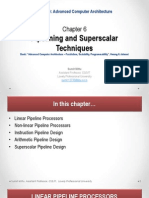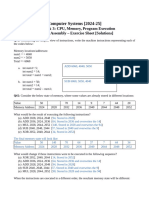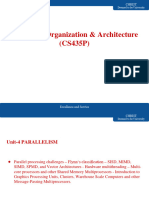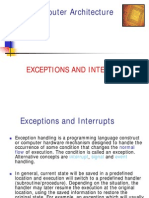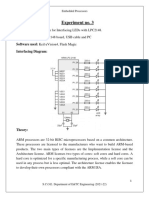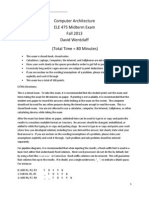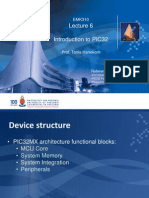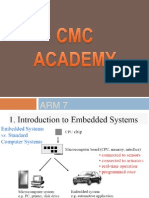0 ratings0% found this document useful (0 votes)
59 viewsACA Assignment
ACA Assignment
Uploaded by
shreyas sachinThis document contains two assignments from a 6th semester computer architecture course. The first assignment asks students to explain Flynn's classification of computer architectures with diagrams, list and explain different shared memory multiprocessor models, apply Bernstein's condition to detect parallelism in a program, and illustrate different levels of parallelism in modern computing. The second assignment asks students to explain linear and non-linear pipeline processors, internal data forwarding and hazard avoidance, floating point and fixed point pipeline units, cache coherence problems, routing techniques, and directory-based cache coherence protocols.
Copyright:
© All Rights Reserved
Available Formats
Download as DOC, PDF, TXT or read online from Scribd
ACA Assignment
ACA Assignment
Uploaded by
shreyas sachin0 ratings0% found this document useful (0 votes)
59 views2 pagesThis document contains two assignments from a 6th semester computer architecture course. The first assignment asks students to explain Flynn's classification of computer architectures with diagrams, list and explain different shared memory multiprocessor models, apply Bernstein's condition to detect parallelism in a program, and illustrate different levels of parallelism in modern computing. The second assignment asks students to explain linear and non-linear pipeline processors, internal data forwarding and hazard avoidance, floating point and fixed point pipeline units, cache coherence problems, routing techniques, and directory-based cache coherence protocols.
Original Description:
Advanced computer architecture assignments
Copyright
© © All Rights Reserved
Available Formats
DOC, PDF, TXT or read online from Scribd
Share this document
Did you find this document useful?
Is this content inappropriate?
This document contains two assignments from a 6th semester computer architecture course. The first assignment asks students to explain Flynn's classification of computer architectures with diagrams, list and explain different shared memory multiprocessor models, apply Bernstein's condition to detect parallelism in a program, and illustrate different levels of parallelism in modern computing. The second assignment asks students to explain linear and non-linear pipeline processors, internal data forwarding and hazard avoidance, floating point and fixed point pipeline units, cache coherence problems, routing techniques, and directory-based cache coherence protocols.
Copyright:
© All Rights Reserved
Available Formats
Download as DOC, PDF, TXT or read online from Scribd
Download as doc, pdf, or txt
0 ratings0% found this document useful (0 votes)
59 views2 pagesACA Assignment
ACA Assignment
Uploaded by
shreyas sachinThis document contains two assignments from a 6th semester computer architecture course. The first assignment asks students to explain Flynn's classification of computer architectures with diagrams, list and explain different shared memory multiprocessor models, apply Bernstein's condition to detect parallelism in a program, and illustrate different levels of parallelism in modern computing. The second assignment asks students to explain linear and non-linear pipeline processors, internal data forwarding and hazard avoidance, floating point and fixed point pipeline units, cache coherence problems, routing techniques, and directory-based cache coherence protocols.
Copyright:
© All Rights Reserved
Available Formats
Download as DOC, PDF, TXT or read online from Scribd
Download as doc, pdf, or txt
You are on page 1of 2
Department of Computer Science and Engg.
6th Semester ‘B’ Sec Computer Architecture (P15CS62)
Assignment-1
Qn. Bloom’s Course
No. Questions Level outcome
Explain Flynn’s classification of computer architecture
1. L2 CO1
with suitable diagrams.
List the different shared memory multiprocessor
2. L1,L2 CO1
model. Explain any two of them.
State and explain Bernstein’s condition and apply for
the following HLL program and hence detect
parallelism.
P1: C = D * E
3. L3 CO1
P2: M = G + C
P3: A = B + C
P4: C = L + M
P5: f = G + E
Illustrate different levels of parallelism in program
4. L2 CO1
execution on modern computing.
5. Explain any two dynamic connection networks. L2 CO1
Explain the data path architecture and pipelined
6. execution of a base scalar processor with the help of a L2 CO2
diagram.
Compare the characteristics of CISC and RISC
7. L2 CO2
processor architectures.
Explain register based and memory based vector
8. L2 CO2
instructions.
Explain central and distributed bus arbitration with the
9. L2 CO2
help of diagram.
Explain the two types of memory interleaving with the
10 L2 CO2
help of a diagram.
Department of Computer Science and Engg.
6th Semester ‘B’ Sec Computer Architecture (P15CS62)
Assignment-2
Qn. Bloom’s Course
No. Questions Level outcome
1. Explain linear pipeline processor L2 CO3
For a given non-linear pipeline with the
reservation table find the following.
i)Forbidden latencies ii) Initial collision vector iii)
Latency cycle and greedy cycle iv)State transition
2. diagram L3 CO3
clock
1 2 3 4 5 6
S1 X X
S2 X X
S3 X X
Explain internal data forwarding and hazard
3. L3 CO3
avoidance mechanism for instruction pipelining.
Describe a pipeline floating point adder unit with
4. L2 CO3
array propagate adder and carry save adder
With a neat diagram, explain pipeline unit for
5. L2 CO3
fixed point multiplication of 8 bit integer.
Explain with a neat diagram, cross point design
6. L2 CO4
and multiport memory.
What is cache coherence problem? Explain the
7. L2 CO4
factors causing cache inconsistency.
Explain store and forward routing and wormhole
8. L2 CO4
routing.
Explain different flow control methods for
9. L2 CO4
resolving a collision between two packets.
Explain directory based protocol to handle cache
10 L2 CO4
coherence problem.
You might also like
- Exploring BeagleBone: Tools and Techniques for Building with Embedded LinuxFrom EverandExploring BeagleBone: Tools and Techniques for Building with Embedded LinuxRating: 4 out of 5 stars4/5 (1)
- Risc ProcessorDocument123 pagesRisc Processormohan sardarNo ratings yet
- Ddco Question BankDocument4 pagesDdco Question BankSabin TtNo ratings yet
- Question BankDocument7 pagesQuestion BankSwathi GuruswamyNo ratings yet
- BCS302 Set 2Document2 pagesBCS302 Set 2megumifushiguru999No ratings yet
- 23mca2co1 Os MQPDocument2 pages23mca2co1 Os MQPyuktakusanale2002No ratings yet
- JNTU COA QuestionsDocument14 pagesJNTU COA QuestionsPavan KalyanNo ratings yet
- CN Module 1 Questions For IADocument2 pagesCN Module 1 Questions For IAKhyathi KiranNo ratings yet
- Screenshot 2024-11-21 at 9.26.21 PMDocument2 pagesScreenshot 2024-11-21 at 9.26.21 PMsevisevithkumarNo ratings yet
- DD&CO Model Set1 Paper 2022 SchemeDocument2 pagesDD&CO Model Set1 Paper 2022 Schemeanveshrao024No ratings yet
- BCS302 Set 1Document2 pagesBCS302 Set 1Mina KimNo ratings yet
- Set 2 External - COADocument2 pagesSet 2 External - COASonu KumarNo ratings yet
- COA Question Bank - CO MappingDocument3 pagesCOA Question Bank - CO MappingKomalNo ratings yet
- Guru Nanak Institutions Technical Campus (Autonomous) : Question Bank With Blooms Taxonomy Level (BTL)Document3 pagesGuru Nanak Institutions Technical Campus (Autonomous) : Question Bank With Blooms Taxonomy Level (BTL)sahithikocharlakotaNo ratings yet
- Rns Institute of Technology: Electronics and Communication EngineeringDocument1 pageRns Institute of Technology: Electronics and Communication EngineeringVinaykumar ANo ratings yet
- Assignment 2Document1 pageAssignment 2Mj KumarNo ratings yet
- DLCODocument2 pagesDLCOmohammedashammolla9676No ratings yet
- Dip Ass 1Document1 pageDip Ass 1lubnaNo ratings yet
- Model Question Paper of Data Base Management SystemDocument2 pagesModel Question Paper of Data Base Management Systemaditya lalNo ratings yet
- CSC219 - 356 - 132 CSC219 Dec 15Document5 pagesCSC219 - 356 - 132 CSC219 Dec 15Aniket AmbekarNo ratings yet
- BPOPS203 Assignment 1Document2 pagesBPOPS203 Assignment 1smsuchethanNo ratings yet
- CN QBDocument4 pagesCN QBSS Return of rebelNo ratings yet
- 22 POP13 Set 2Document3 pages22 POP13 Set 2Khushi GuptaNo ratings yet
- 22 POP13 Set 2Document3 pages22 POP13 Set 2yoga vNo ratings yet
- Daa QBDocument6 pagesDaa QBshravya vNo ratings yet
- BCS403Document5 pagesBCS403guru672672No ratings yet
- @vtucode - in BCS403 Model Paper 2022 SchemeDocument5 pages@vtucode - in BCS403 Model Paper 2022 SchemePAVITRA NARASHIMA MURTHYNo ratings yet
- DAA - Question Bank CSE BDocument5 pagesDAA - Question Bank CSE BLOKESWARI GNo ratings yet
- DBMS (BCS403) MQPsolvedDocument102 pagesDBMS (BCS403) MQPsolvedPravallika ReddyNo ratings yet
- Sem 4 PCS M1 Retest QP FinalDocument2 pagesSem 4 PCS M1 Retest QP Finalsaran kumarNo ratings yet
- 21MT653Document3 pages21MT653Malathesh HosamaneNo ratings yet
- USN 18CS654: B. E. Degree (Autonomous) Sixth Semester End Examination (SEE)Document2 pagesUSN 18CS654: B. E. Degree (Autonomous) Sixth Semester End Examination (SEE)Sarmi HarshaNo ratings yet
- 20321Document4 pages20321muthusaravanan1645No ratings yet
- Course Title: DATA NETWORKS: Time: 03 Hours Maximum Marks: 100 Instructions To CandidatesDocument3 pagesCourse Title: DATA NETWORKS: Time: 03 Hours Maximum Marks: 100 Instructions To CandidatesMohit KumarNo ratings yet
- CN - Question Bank - I.A.E.-IDocument2 pagesCN - Question Bank - I.A.E.-Isaaiemsalaar525No ratings yet
- Question PaperDocument2 pagesQuestion Paperm.honnu05No ratings yet
- 21ai643 Model PaperDocument2 pages21ai643 Model PaperYashwanth NNo ratings yet
- Internal Test II DpcoDocument2 pagesInternal Test II DpcomaheshwariNo ratings yet
- BCS302Document2 pagesBCS302sagarblazaNo ratings yet
- Intro To CDocument2 pagesIntro To CH KNo ratings yet
- 22PLC15Bset1 230320 160331Document3 pages22PLC15Bset1 230320 160331Vishu MalshettyNo ratings yet
- OSDocument2 pagesOSDileep KumarNo ratings yet
- 22 PLC15 Bset 1Document2 pages22 PLC15 Bset 1Himanshu ChouhanNo ratings yet
- 18CS44 Microcontroller Embedded Systems Model Question Paper 3Document2 pages18CS44 Microcontroller Embedded Systems Model Question Paper 3Prince AdnanNo ratings yet
- 18CS44 Model Question Paper-1 With Effect From 2019-20 (CBCS Scheme)Document2 pages18CS44 Model Question Paper-1 With Effect From 2019-20 (CBCS Scheme)M.A rajaNo ratings yet
- 18CS44 Model Question Paper-1 With Effect From 2019-20 (CBCS Scheme)Document2 pages18CS44 Model Question Paper-1 With Effect From 2019-20 (CBCS Scheme)Mansi R UNo ratings yet
- Dpco QBDocument3 pagesDpco QBmhvvfvkr50No ratings yet
- P18ec53 U2Document2 pagesP18ec53 U2nandiniNo ratings yet
- bcs302 Set1 Model Question PaperDocument3 pagesbcs302 Set1 Model Question PaperMadhura N KNo ratings yet
- MODEL QP FOR AI&DS alphaDocument2 pagesMODEL QP FOR AI&DS alphaithodNo ratings yet
- CN QP Pattern IIDocument2 pagesCN QP Pattern IISivakumar MuthuNo ratings yet
- BCS302Document2 pagesBCS302honallivarunNo ratings yet
- Odd Semester Session (2020-2021) Third Internal Assessment Test, November-2020 (Offline)Document2 pagesOdd Semester Session (2020-2021) Third Internal Assessment Test, November-2020 (Offline)study materialNo ratings yet
- MQ3 21cst602-CgipDocument3 pagesMQ3 21cst602-Cgiptanushreeshankar3No ratings yet
- Aiml Mod2 &3 Imp QnsDocument6 pagesAiml Mod2 &3 Imp QnsAmitNo ratings yet
- Question BankDocument5 pagesQuestion Banksupriyasupi133No ratings yet
- DCCN - Question Bank - Module - 1Document2 pagesDCCN - Question Bank - Module - 1santholin27No ratings yet
- BCS403 - DBMS - Assignment2 (3 Sets)Document3 pagesBCS403 - DBMS - Assignment2 (3 Sets)ankitkrypton123No ratings yet
- DS M1 QUestion BankDocument2 pagesDS M1 QUestion BankNidhi H BarakerNo ratings yet
- Model C Programming QP 1&2Document4 pagesModel C Programming QP 1&2ChandraNo ratings yet
- Pipelining and Superscalar Techniques: CSE539: Advanced Computer ArchitectureDocument49 pagesPipelining and Superscalar Techniques: CSE539: Advanced Computer ArchitectureNusrat Mary ChowdhuryNo ratings yet
- PIC12F529T39A: 14-Pin, 8-Bit Flash MicrocontrollerDocument98 pagesPIC12F529T39A: 14-Pin, 8-Bit Flash MicrocontrollerAjeng FanyNo ratings yet
- Lesson 7: System Performance: ObjectiveDocument2 pagesLesson 7: System Performance: ObjectiveVikas GaurNo ratings yet
- Boom Spec PDFDocument70 pagesBoom Spec PDFRajesh GanesanNo ratings yet
- Activity 1 - 2021 HpcaDocument4 pagesActivity 1 - 2021 HpcaPRATIK DHANUKANo ratings yet
- Shivalik College of Engineering Question Bank Computer Organization B.Tech II Year (IV Semester)Document5 pagesShivalik College of Engineering Question Bank Computer Organization B.Tech II Year (IV Semester)Paras TilaraNo ratings yet
- 03 - CPU Memory Program Execution Assembly - Exercise Sheet (Solutions) - 1504219614Document6 pages03 - CPU Memory Program Execution Assembly - Exercise Sheet (Solutions) - 1504219614adithyaa sudhakarNo ratings yet
- 491 Part%2B1%2B-%2BTareaDocument3 pages491 Part%2B1%2B-%2BTareaDiana PanchanaNo ratings yet
- Pipeline (Agent (Label ') Stages (Stage ( Build') (Steps (SH MVN Install') ) ) )Document2 pagesPipeline (Agent (Label ') Stages (Stage ( Build') (Steps (SH MVN Install') ) ) )gvcsvgNo ratings yet
- Solutions To Set 8Document18 pagesSolutions To Set 8kitana_sectNo ratings yet
- Quiz2 - 2022 SolutionDocument4 pagesQuiz2 - 2022 SolutionDHARMESWAR BASUMATARYNo ratings yet
- Unit 4Document84 pagesUnit 4rishabelixir5492No ratings yet
- Comp+Arch+Wk+6 Interrupts+++FP+Pipeline Aut09Document31 pagesComp+Arch+Wk+6 Interrupts+++FP+Pipeline Aut09arslan05No ratings yet
- Experiment No. 3Document6 pagesExperiment No. 3John FarandisNo ratings yet
- Mces MCQDocument50 pagesMces MCQshrimanNo ratings yet
- Comparch Comparch-002 Exams Midterm A8Xj46NCRoDocument9 pagesComparch Comparch-002 Exams Midterm A8Xj46NCRoMattia LeNo ratings yet
- COA Solved Question PaperDocument10 pagesCOA Solved Question Papergovopi6584No ratings yet
- Prof. Sudhir Bussa: Designing of 32 Bit RISC-V MicroprocessorDocument11 pagesProf. Sudhir Bussa: Designing of 32 Bit RISC-V MicroprocessorShravan KumarNo ratings yet
- Digital Signal Processing AdvancedDocument14 pagesDigital Signal Processing AdvancedMathi YuvarajanNo ratings yet
- DSP ProcessorsDocument24 pagesDSP ProcessorsHerald Rufus100% (1)
- Introduction To PIC32: ReferencesDocument22 pagesIntroduction To PIC32: ReferencesAlexandra PopescuNo ratings yet
- Vtune Profiler - Cookbook - 2023.0 766316 766317Document323 pagesVtune Profiler - Cookbook - 2023.0 766316 766317adrian ZhangNo ratings yet
- 10) WASE 2018 - Comp - Org - Archi - Flipped - HODocument14 pages10) WASE 2018 - Comp - Org - Archi - Flipped - HOShreyansh AnshumanNo ratings yet
- Chapter 04 RISC VDocument130 pagesChapter 04 RISC VTrí ĐôNo ratings yet
- CMC ArmDocument79 pagesCMC ArmMujikeer MohammedNo ratings yet
- COE301 Final Solution 162Document10 pagesCOE301 Final Solution 162Karim IbrahimNo ratings yet
- ACA AssignmentDocument4 pagesACA AssignmentDisha goyalNo ratings yet
- Realtime Compendium PDFDocument119 pagesRealtime Compendium PDFCarlos MontezNo ratings yet
- Advantages and Disadvantages MPDocument5 pagesAdvantages and Disadvantages MPVidhya AigalNo ratings yet


